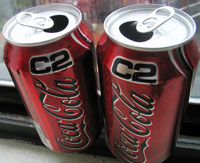(Don’t) put it in your mouth
This story is about the randomness of life.
It began Tuesday night, when Martha McPhee’s heart-breaking book “L’America†reminded me of how our choices open us up to unforeseen events, which will—when the lights go off—define our life. Beth and Cesare met because their seemingly inconsequential decisions brought them to the coast of Greece at the same time. Choices about who they wanted and/or had to be eventually kept them apart (Beth was American, Cesare was Italian), but they never forgot. They, like all of us, were “ordinary people engaged in ordinary lives that amount to everything.â€
This is that kind of story.
Late Saturday afternoon, panic began creeping in. I was going to be alone that night and that didn’t sit well with me. Especially not after spending Friday night in the company of the Boston hipster establishment, sipping tall-boy PBRs, and using the wrongest pickup conversation topics January has seen.
Eventually, I decided to suck it up, spend Saturday night at home, and crawl into bed with a book. Not a bad idea, since it’s finally warm in my room after I isolated a leaky window using double sided tape and a plastic sheet—crafty and homelessy at the same time. I decided it was time to read Paul Auster’s “The Brooklyn Follies†and four hours later I welcomed midnight by finishing it and nodding in approval at my decision to read it. The book was also about chances, randomness, love (though less personal and more directed to humankind), the stupidity of men, and about never underestimating the power of surprise this thing called life holds. When Nathan Glass, the narrator of this tale, shows up to his surprise 60th birthday party, he wisely proclaims (quoting a Mets manager): “There comes a time in everyone’s life, and I had plenty of them.â€
This made roll around in laughter. My good friend Adi sometimes uses the first part of that sentence and I knew I never quite found the perfect ending to it. Now I had it.
But this story, while about randomness, is not about Adi or about parties. It’s about my mouth—sort of.
I turned off the light ready for sleep and that’s when I heard my landlord/roommate return home with her date (both of them in their mid to late 40s). They were laughing and being noisy, which was rare. Was that spanking I heard? And what about the ripping noise? Are they peeling wallpaper? At 1 AM? And what’s with the pounding? Are they hammering? Are they changing the art on the walls? That sounds like too many new nails. Are they hanging a shower curtain across the living room?
Needless to say I fell asleep in a state of utter confusion. It wasn’t enough that Paul Auster made me think of what to do with my life, but now I was also stuck with the mystery of the deep night noises.
I woke up late. 10 AM. Very unlike me. Still, I felt good. My mind was sharp, and the room was still warm. This was going to be a good Sunday. I dragged myself slowly to the kitchen, and then I saw it.
An axe was on the floor, in the middle of the living room. So was half of a big ass log (I live in the city, not in the woods!) and debris all around it. I looked at the fireplace and saw another big ass log was lying there bored as shit, smoking itself out. In the three months I’ve lived here the fireplace has been used for storage, but some kind of “spontaneous things to do†list must have told my landlord to chop wood at 1 AM and get it going. As simple as that I had solved the mystery of the noise, which only made the omelet and toast taste better.
I then rushed off to the gym, where just a few days earlier—the same day I finished “L’Americaâ€â€”I found out I weighed less than I expected and decided I should diversify my diet of cereal, eggs and yoghurt (and the occasional vodka tonics).
After the gym I stopped at the grocery store to buy detergent, but I didn’t have enough money for my trusty Tide. But I did have enough for a medium non-fat latte (which I picked up at my favorite neighborhood coffee shop), and then walked home to the beat of Dr. Alban’s early 1990s hit “It’s my life.†The latter was hot and a pleasure to hold in the friggin’ cold. But it was sunny outside so I didn’t care about the cold. Life was good. In a few hours, the Saints would face the Bears for a place in the Super Bowl and that gave me goose bumps (I’m buying a Drew Brees) jersey if the Saints make it there). The mailbox hid the last issue of Wired, as well as the my first New Yorker in a while (after reading two great essays on literature by Orhan Pamuk and Milan Kundera I had decided it was time to subscribe again). This was a great Sunday.
But this story is about what happened after I climbed the stairs to my second floor apartment and opened the door.
My landlord apologized for the wood chopping and the mess, and I said I hadn’t heard a thing. It was no big deal and I like the occasional mystery. But as I started down the hallway to my room, the toilet flushed and the man walked out of the bathroom. With foam in the corners of his mouth, he was vigorously brushing his teeth using a white toothbrush with blue rubber grip.
MY TOOTHBRUSH!
This is a story about returning home, coffee in hand, smile firmly planted on your face and finding a man in his late 40s, forcefully working the inside and outside of his teeth with your toothbrush. And for all you know, this probably wasn’t the first time he did it.
I am not one to be easily grossed out. I have let women use my toothbrush, and I have used the toothbrushes of others. I ate food of the floor. I ate candy and snacks that I found inside the sofa. I bought and worn second-hand underwear. I sat on dubious toilets. I ate my boogers, grass, paper and drank oil (some of these were done unintentionally). I even spent the better part of an hour sniffing somebody to figure out where a certain funky odor was coming from (to my surprise, it was her belly button).
But seeing this man with my toothbrush in his mouth was too much. I imagined he had used the last time he was here as well. Maybe he’s been using it since Christmas. Or earlier. Maybe we’ve both been doing the same brush for a while, utterly oblivious of its duplicity. This was just too much. Not only do I not know this man, but the thought of brushing my teeth with the same toothbrush he used made me feel I tasted the 1970s and 1980s in rapid succession. I had contemporary American history in my mouth. Decades of it. I brushed my left side with the Reagan years. The left maybe with a failed marriage. Certainly with my landlord. Maybe with one of those dry-mouth hangovers. The memories of some nasty colds in the 1990s. Who the hell knows?
There is only so much history I’m willing to stick and hold inside my mouth. I’m sensitive like that.
I took in a deep breath and quickly said a mental goodbye to the toothbrush. I grabbed my wallet and rushed out to get a new one, along with the detergent I previously had no money for. As I walked out I realized that if I had had enough money for the detergent earlier, the time I would have spent with the cashier would have made me miss the toothbrush episode. It would have negated me the truth about what I put in my mouth.
Life is random my friends. And what you put into your mouth matters. My new toothbrush will now be located in my room.
* Post written to the sounds of The Umbrellas and stellastarr*.
 I don’t enjoy the idea of ranking books the way I do music because it’d be too much like ranking my reaction to reading them. Which would be odd to say the least. Plus, the books I read in a particular year have not necessarily been released at the same time. In 2006, I made the discovery of a great trinity of writers, which have in common a whole bunch of awesomeness–if not generally roaring reviews
I don’t enjoy the idea of ranking books the way I do music because it’d be too much like ranking my reaction to reading them. Which would be odd to say the least. Plus, the books I read in a particular year have not necessarily been released at the same time. In 2006, I made the discovery of a great trinity of writers, which have in common a whole bunch of awesomeness–if not generally roaring reviews
